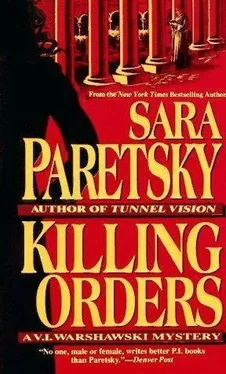Sara Paretsky - Killing Orders
Здесь есть возможность читать онлайн «Sara Paretsky - Killing Orders» весь текст электронной книги совершенно бесплатно (целиком полную версию без сокращений). В некоторых случаях можно слушать аудио, скачать через торрент в формате fb2 и присутствует краткое содержание. Жанр: Детектив, на английском языке. Описание произведения, (предисловие) а так же отзывы посетителей доступны на портале библиотеки ЛибКат.
- Название:Killing Orders
- Автор:
- Жанр:
- Год:неизвестен
- ISBN:нет данных
- Рейтинг книги:3 / 5. Голосов: 1
-
Избранное:Добавить в избранное
- Отзывы:
-
Ваша оценка:
- 60
- 1
- 2
- 3
- 4
- 5
Killing Orders: краткое содержание, описание и аннотация
Предлагаем к чтению аннотацию, описание, краткое содержание или предисловие (зависит от того, что написал сам автор книги «Killing Orders»). Если вы не нашли необходимую информацию о книге — напишите в комментариях, мы постараемся отыскать её.
Killing Orders — читать онлайн бесплатно полную книгу (весь текст) целиком
Ниже представлен текст книги, разбитый по страницам. Система сохранения места последней прочитанной страницы, позволяет с удобством читать онлайн бесплатно книгу «Killing Orders», без необходимости каждый раз заново искать на чём Вы остановились. Поставьте закладку, и сможете в любой момент перейти на страницу, на которой закончили чтение.
Интервал:
Закладка:
I staggered into the bathroom, took a cold shower, and dressed in the new crimson outfit with more haste than grace. I dumped makeup from my suitcase into my purse, pulled on nylons and boots, stuck my Magli pumps under my arm, and headed for the car. I had a choice of the navy pea jacket or something filled with smoke, and chose the pea jacket-I’d just be checking it, after all.
I was only twenty minutes late to the Hanover House, and happened to arrive at the same time as Phil. He was too well behaved to look askance at my outfit. Kissing me lightly on the cheek, he tucked my arm into his and escorted me into the hotel. He took boots and coat from me to check. The perfect gentleman.
I’d put my makeup on at traffic lights and run a comb through my hair before leaving the car. Remembering the great Beau Brummell, who said that only the insecure primp once they’ve reached the party, I resisted the temptation to study myself in the floor-length mirrors covering the lobby walls.
Dinner was served in the Trident Salon on the fourth floor. Smaller than the Grand Ballroom, it seated two hundred people who had paid a hundred dollars each for the privilege of dining with the archbishop. A gaunt woman in black collected tickets at the entrance to the salon. She greeted Phil by name, her thin, sour face coming close to pleasure at seeing him.
“I guess it’s Dr. Paciorek, now isn’t it? I know how proud your parents must be of you. And is this the lucky young lady?”
Phil blushed, suddenly looking very young indeed. “No, no, Sonia… Which table for us?”
We were seated at table five, in the front of the room. Dr. and Mrs. Paciorek were at the head table, along with O’Faolin, Farber, and other well-to-do Catholics. Cecelia and her husband, Morris, were at our table. She was wearing a black evening gown that emphasized her twenty extra pounds and the soft flab in her triceps.
“Hello, Cecelia. Hi, Morris, good to see you,” I said cheerfully. Cecelia looked at me coldly, but Morris stood up to shake hands with me. An innocuous metals broker, he didn’t share the family feud against Agnes and her friends.
For a hundred dollars, we got a tomato-based seafood chowder. The others at our table had already started eating; waiters brought Phil and me servings while I studied the program next to my plate. Funds raised by the dinner would support the Vatican, whose assets had been depleted by the recent recessionary spiral and the fall of the lira. Archbishop O’Faolin, head of the Vatican Finance Committee, was here to thank us in person for our generosity. After dinner and speeches by Farber and O’Faolin, and by Mrs. Catherine Paciorek, who had graciously organized the dinner, there would be an informal reception with cash bar in the George IV Salon next to our dining room.
The overweight man on my left took a second roll from the basket in front of him but forbore to offer me any: hoard the supplies. I asked him what kind of business he was in and he responded briefly, “Insurance,” before popping half the roll into his mouth.
“Splendid,” I said heartily. “Brokerage? Company?”
His wife, a thin, twittery woman with a wreath of diamonds around her neck, leaned across him. “Harold is head of Burhop and Calends’ Chicago office.”
“How fascinating!” I exclaimed. Burhop and Calends was a large national brokerage house, second in size behind Marsh and McLennan. “It so happens I’m working for Ajax Insurance right now. What do you think the impact would be on the industry if an outside interest acquired them?”
“Wouldn’t affect the industry at all,” he muttered, pouring a pint of Thousand Island dressing over the salad he’d just received.
Phil nudged my arm. “Vic, you don’t have to do a suburban Girl Scout impersonation just because I asked you to dinner. Tell me what you’ve been doing, instead.”
I told him about my fire. He grimaced. “I’ve been on call almost all week. Haven’t seen a paper. I sometimes think the world could blow up and the only way I’d know would be by the casualties coming into ER.”
“But you like what you do?”
His face lit up. “I love it. Especially the research end. I’ve been working with epileptics during surgery to try to map neuron activity.” He was still young enough to give an uneducated audience the full force of his technical knowledge. I followed as best I could, more entertained by his enthusiasm than by what he was actually saying. How you get a verbal response from people whose brains are being operated on carried us through some decent halibut steak, which Phil ignored as he drew a diagram in pen on his cloth napkin.
Cecelia tried to catch his eye several times; she felt tales of blood and surgery were not suited to the dinner table, although most of the guests were discussing their own operations, along with their children or what kind of snow-removal equipment they owned.
When the waiters removed the dessert plates, including Phil’s uneaten profiteroles, the room quieted so that his was the only voice that carried. “That’s what they really mean by a physiological map,” he said earnestly. A ripple of laughter made him blush and break off in midsentence. It also drew the head table’s attention to him.
Mrs. Paciorek had been too busy entertaining Archbishop O’Faolin to look at her children during dinner. Since eating had been well under way when we arrived, she probably never noticed Phil and me at all. Now his exposition and the laughter made her turn slightly so that she could identify the source. She saw him, then me. She froze, her well-bred mask slipping slightly. She glanced sharply at Cecelia, who made a helpless gesture.
Mrs. Paciorek nudged Archbishop O’Faolin and whispered to him. He, too, turned to stare at our table, which was only fifteen feet or so away. Then he whispered back to Mrs. Paciorek, who nodded firmly. Instructions to get the Swiss Guard to throw me out?
Phil was furiously stirring cream into his coffee. He was also still young enough to mind very much being laughed at. Under the noise of scraping chairs, as people rose for Cardinal Farber’s post-dinner benediction, I patted his arm comfortingly and said, “Remember: The only real social sin is to care what other people think of you.”
Farber gave a brisk blessing for the meal we had just enjoyed, and went on to talk about how the Kingdom of Heaven could only be tended on earth with the help of earthly things, that God had given us an earthly creation to care for, and that the work of the temporal church could only be carried out with material goods. He felt especially blessed in being the archbishop of Chicago, not just the world’s largest archdiocese but also the most generous and loving. He was gratified at the response Chicago had made to the urgent needs of the Vatican, and here to thank us in person was the Most Reverend Xavier O’Faolin, archbishop of Ciudad Isabella and head of the Vatican Finance Committee.
Well pleased with his praise, the crowd clapped enthusiastically. O’Faolin stepped to the podium at a raised stand in front of the room, commended his words to God in Latin, and began to speak. Once again the Spanish accent was so thick as to be nearly incomprehensible. People strained to listen, then squirmed, and finally began murmured private conversations.
Phil shook his head. “I don’t know what’s wrong with him tonight,” he said. “The old boy usually speaks perfect English. Mother must have knocked him off balance.”
I wondered again at the whispered exchange between her and O’Faolin. Since it was impossible to follow the Panamanian archbishop I let my mind wander. Applause roused me from a doze, and I shook my head to try to wake up again completely.
Phil commented sarcastically on my sleeping, then said, “Now comes the fun part. You go around the reception detecting to see if you can find your mysterious caller, and I’ll watch.”
Читать дальшеИнтервал:
Закладка:
Похожие книги на «Killing Orders»
Представляем Вашему вниманию похожие книги на «Killing Orders» списком для выбора. Мы отобрали схожую по названию и смыслу литературу в надежде предоставить читателям больше вариантов отыскать новые, интересные, ещё непрочитанные произведения.
Обсуждение, отзывы о книге «Killing Orders» и просто собственные мнения читателей. Оставьте ваши комментарии, напишите, что Вы думаете о произведении, его смысле или главных героях. Укажите что конкретно понравилось, а что нет, и почему Вы так считаете.












